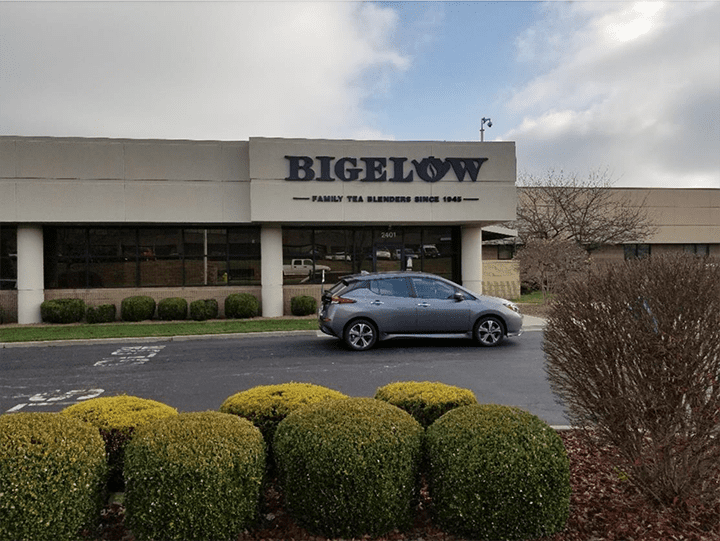Bigelow Tea Enhances Sustainability with a Vehicle-to-Grid System
Sustainability is a buzzword that’s being bantered about up and down Wall Street, and corporate leaders have taken notice. Many companies have adopted environmental, social, and governance (ESG) initiatives, which are often tied to sustainability goals. In some cases, the pressure to do so has come from customers and/or investors, but in others, CEOs and boards are simply choosing to “do the right thing” to help save the planet.
“A lot of companies are really recognizing, we need to use our money to make a difference, we need to use our money to make this world a better place,” Cindi Bigelow, president and CEO of Bigelow Tea, said as a guest on The POWER Podcast.
Bigelow Tea, which is 100% family owned and operated, has implemented several measures to enhance the company’s sustainability. In addition to obtaining all of its electric power from renewable energy sources, Bigelow Tea also has a waste reduction, recycling, and composting program, which has resulted in all three of its facilities achieving zero-waste-to-landfill status. The company’s most recent sustainability initiative involved installing a vehicle-to-grid (V2G) system in collaboration with Fermata Energy (Figure 1).

The V2G system includes a bidirectional charger connected to a Nissan LEAF electric vehicle (EV). “What those two elements are doing is they’re operating behind the building’s electric load, and they are managing the building’s electric load in such a way that when the load starts to peak during the billing cycle, we dispatch energy out of the vehicle into the building load behind the meter. And what that does is it reduces the utility costs—the energy costs—for the building by however much dispatchable energy we were able to put into that load. So, we save the customer money,” David Slutzky, founder and CEO of Fermata Energy, said on the podcast. “It’s a customer bill management application.”
“Yes, it’s reducing your utility bills,” Bigelow said, but the program accomplishes much more than that. In fact, she suggested there were three clear benefits. One is that the V2G system allows Bigelow Tea to identify when it is operating during peak-load periods, which lets the company make changes within its operational system to reduce load, which is important in the long term. Secondly, if more companies incorporate V2G systems, the total peak demand on the grid will be lessened, which benefits everyone. The third benefit is in Bigelow Tea’s ability to utilize the EV for transportation purposes (Figure 2), which reduces emissions, because, as previously noted, the company gets all of its electric power from renewable sources. “So, there’s many facets to why this program is so important and beneficial for our company,” Bigelow said.

Some naysayers have suggested that EV battery life can be adversely affected when used in V2G systems. Slutzky suggested the fears are unwarranted. “First of all, every car charges, and it discharges, its battery. So, that’s not unique,” he said. V2G usage isn’t necessarily any different than the driving duty cycles, there’s just more of it, and not necessarily very much more, he said.
“There was an interesting study in the UK that looked specifically at the battery degradation impacts on a LEAF that come from doing behind-the-meter demand charge management and frequency regulation market participation, and what was interesting about that study, they concluded that in a properly managed vehicle-to-grid ecosystem, where you have an operator like Fermata Energy controlling the charge and the discharge activities, you can extend battery life,” Slutzky said.
The reason is that many EV owners simply plug their cars in and let them sit on the charger for extended periods, even after the batteries are fully charged. Whereas, a properly managed system will hold a battery’s charge in a more optimal state. Furthermore, Slutzky said manufacturers generally provide battery warranties for up to 8 years or 100,000 miles. They wouldn’t do that if the batteries couldn’t handle the duty cycle. In any case, customers are essentially protected from failure risks through warranties.
In the end, Bigelow suggested all CEOs need to spend time developing and implementing sustainability initiatives. She acknowledged that companies must focus on their core products and services, and turn a profit. “But at the same time, we have to remember, we can make a difference both for our employees, for the community, and the environment, and this is a very important part of what we do,” Bigelow said.
To learn more about Bigelow Tea’s V2G system and other projects Fermata Energy has been involved in, listen to the full interview with Bigelow and Slutzky on The POWER Podcast. Follow the links below to subscribe via your favorite platform or click on the SoundCloud player to listen now:
For more power podcasts, visit The POWER Podcast archives.
—Aaron Larson is POWER’s executive editor (@AaronL_Power, @POWERmagazine).